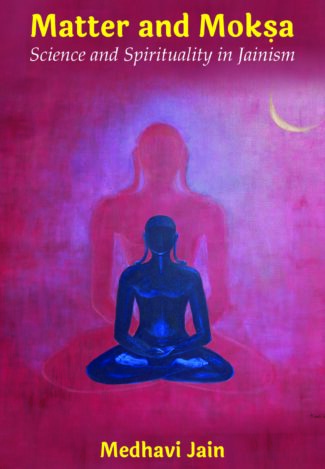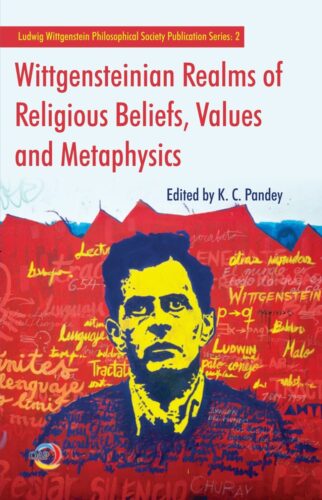

Matter and Moksa...
Matter and Moksa
Science and Spirituallity in Jainism by: Medhavi JainThe book deals with the leading theory and practices of Jainism, putting much focus on ethics, thereby to the theory of karma, it also delves upon with the theory of yoga philosophy of non-absolutism, and the concept of time, space, metaphysics, etc.
Original price was: ₹700.00.₹630.00Current price is: ₹630.00.
ISBN: 9788124612170
Year Of Publication: 2025
Edition: 1st
Pages : xvi, 212
Bibliographic Details : Bibliography, Index
Language : English
Binding : Hardcover
Publisher: D.K. Printworld Pvt. Ltd.
Foreword By : Shugan Chand Jain
Size: 22
Weight: 450 grams
“In Matter and Mokṣa, matter indicates the subject of science, whereas mokṣa refers to the peak of spirituality, as described by the Indian thinkers of Jaina philosophy. Interestingly, science and spirituality have always been intertwined subjects for Indian scholars. Where one is incomplete without the other, as the spiritual self is the only one who embarks on the journey to be a scientist. The book starts with the leading theory and practices in Jainism by throwing light upon the importance of ethics in one’s life. In Indian culture, ethics are directly linked with the actions one performs; hence covers the theory of karma. Then comes the importance of knowledge in improvising one’s reactions to lead a peaceful and non-violent life. Moving ahead comes yoga, which holds a very high significance in all Indian traditions and according to Jaina philosophy, it is an inseparable part of a being’s life. It further talks about the basics of the theory of non-absolutism as described by the 24th and the last Ford maker Mahāvīra.
The book throws light upon the concept of space, time, cosmography and metaphysics. It also covers the spiritual aspect by explaining the concepts of soul, mind and body, the importance of meditation, nine categories of truth, the concept of God and then the final destination, the ultimate purpose of existence mokṣa as explained in Jainism.”
“Foreword — Shugan Chand Jain vii
Preface ix
Acknowledgements xi
1. Main Theories and Practices in Jainism 1
Right Conduct and Ethics 1
Karma in Jaina Philosophy 12
Cause and Aspects of Kārmic Bondage 14
Types of Karma 15
Leśyā or Kārmic Colourations 23
Shedding Of karma (Nirjarā) 24
Karma in the Light of Cause and Effect 27
Theory of Knowledge 28
Types of Knowledge 32
Knowledge and the Supreme Being 36
Attaining Right Knowledge 37
Accessing Knowledge 39
Yoga 40
Bāraha Bhāvanās 42
Yoga and the Awakening of Cakras 43
Yoga and the Final Destination 44
Yoga and Kārmic Bondage 45
Yoga and Kaṣāya (Passions) 48
Non-Absolutism (Anekāntavāda Syādavāda and 49
Nayavāda)
Anekāntavāda 49
Syādavāda (The Theory of Contextual Perspective) 55
Nayavāda (The Theory of Different Standpoints) 57
Nayavāda and Karma 62
Anekāntavāda and Truth 63
Comparison with the Theory of Relativity 67
Anekāntavāda and the Uncertainty Principle 68
2. Science in Jainism 71
Dravya (Substance) 73
Six Universal Qualities of a Substance 75
Pudgala (Matter) in Jaina Philosophy 76
Types of Pudgala 78
Skandha (Group of Infinite Absolute Atoms) and 79
Molecule
Paramāṇu (the Absolute Atom) in Jaina Philosophy 81
Matter and Atom in Different Philosophies 84
Absolute Particle, Quantum Mechanics and 86
Supersymmetry
Paramāṇu, Pudgala Karma (Material Karma) and 88
Soul as Substances
Concept of Space 90
Cosmic and SupraCosmic Space 91
Singularity of Space 93
Relationship among Dharma Dravya, Adharma Dravya 94
and Ākāśa Dravya
Time 96
Practical Time and Transcendental Time 98
(Vyavahāra Kāla and Niścaya Kāla)
Singularity and Eternality of Time 100
Why Has Time Been Considered a Substance? 100
Time Cycle in Jaina Philosophy 102
Cosmology 106
Universe in Jaina Philosophy 108
Modern Cosmology 111
Metaphysics 114
Metaphysics in Jaina Philosophy 116
Categories of Truth as Described in the Text on 118
Reality: Tattvārtha Sūtra
Metaphysics of Paramāṇu (Absolute Atom) 122
Metaphysics, Ethics, Cause and Effect 124
Metaphysics, Knowledge and Perception 126
3. Spirituality in Jainism 131
The Concept of Soul 131
Soul Substance as Jīva Dravya in Jaina Philosophy 132
Characteristics of Soul 133
Self-realization: The Key to Evolution 135
Beginningless Association of the Living (Jīva) and 138
the Non-living (Karma)
Fourteen Guṇasthāns: the Ladder of Spiritual Exaltation 140
Siddha: Souls That Have Attained liberation (Mokṣa) 150
Mind and Body 151
Mind in the Philosophy of Jainism 152
Types of Mind: Dravya Mana (Physical Mind) and 153
Bhāva Mana (Abstract Mind)
Physical Mind 153
Abstract Mind 154
Relationship between the Mind and the Soul 155
Meditation 159
Meditation in the Philosophy of Jainism 159
Ārtta Dhyāna 161
Raudra Dhyāna 161
Piṇḍastha Dhyāna 162
Padastha Dhyāna 162
Rūpastha Dhyāna 163
Rūpātīta Dhyāna 163
Sāmāyika Dhyāna 163
Dharma Dhyāna 164
Śukla Dhyāna 165
Twelve Contemplations (Bārasa Aṇuvekkhā /Anuprekṣā) 166
Anitya Bhāvanā (Transitoriness) 166
Aśaraṇa Bhāvanā (Helplessness) 167
Ekatva Bhāvanā (Solitariness) 167
Anyatva Bhāvanā (Distinctness) 168
Saṁsāra Bhāvanā (Transmigration) 169
Loka Bhāvanā the Universe 169
Aśucitva Bhāvanā (Impurity) 170
Āsrava Bhāvanā (Influx) 170
Saṁvara Bhāvanā (Stoppage) 171
Nirjarā Bhāvanā (Dissociation) 172
Dharma-svākhyātatva Bhāvanā (the Truth 172
Proclaimed by Religion)
Bodhi-durlabha Bhāvanā (Rarity of Enlightenment) 173
Liberation (Mokṣa) and Godhood 173
God or Godhood? 174
Arhanta: the Crest of Evolution 176
Accessibility of Achieving the State of Godhood: 178
The Siddha
Tīrthaṁkara: Men with Exceptional Leadership Skills 178
Mokṣa (Liberation) and the Path to Attain It 179
Mokṣa: A State of Sheer Independence 182
Bibliography 183
Index 189”










There are no reviews yet.